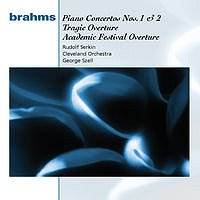The two piano concertos of Brahms are major works in
every sense. Each of them requires a level of heroic virtuosity which
only the leading virtuosi of the day can possess. Yet this alone is
not enough, since the relationship with the orchestra is so subtle and
integrated, and on the largest scale too. For these are veritable symphonies,
in which piano and orchestra develop the material with strength and
integrity, and above all with a sense of teamwork that is second to
none.
All these extraordinary phenomena are experienced in
these performances by Rudolf Serkin and the Cleveland Orchestra conducted
by George Szell. The First Concerto went through various stages of development
until its reached its final identity; and there are those who claim
that Brahms composed nothing better. It is certainly right to discuss
the work in those unequivocal terms, and the magisterial playing of
Serkin, allied to the subtle orchestral lines directed by that master
Brahmsian George Szell, combine to give us a performance that is second
to none. The tempestuous opening, at once agitated and maestoso, sets
the tone, and Serkin shows a true command of the large scale vision
which is at the heart of this masterpiece, which plays for in excess
of 45 minutes.
The Second Concerto is no less fine. The Cleveland
horn player makes a most effective opening to the work with a marvellously
played solo, before the piano adds an heroic dimension with an initial
cadenza which immediately extends the range. The first movement remains
one of Brahms's greatest achievements, wide-ranging yet developed with
the utmost cogency and urgency.
The rhythmic attack in the second movement scherzo
is particularly exciting, not least because Szell's tempi are so keenly
judged. There is both attack and vitality. The slow movement, on the
other hand, is eloquence itself. There is a lengthy and important solo
for the cello, beautifully played by the Cleveland Orchestra's principal,
and it is in fact some several minutes before the entry of the soloist
confirms that the piano concerto continues. Serkin is equally at home
in phrasing and shaping the slower, expressive music, as he is in pressing
the driving rhythms which are so important elsewhere.
The finale, surprisingly, uses a smaller orchestra
with no trumpets, but it has a dance-like vitality founded upon that
Hungarian flavour of which Brahms was so fond in such movements. It
is no surprise that George Szell is in his element here, and plays his
full part in giving us one of the great recorded performances of this
wonderful concerto.
Szell and the orchestra take centre-stage in the opening
items on each disc, the Academic Festival Overture and Tragic Overture,
respectively. Both performances are keenly played and full of subtleties
as well as - in the case of the latter- strength and power. The recordings
match those of the two concertos, and are clear in focus and direct
in impact. They are far from perfect, having been re-mastered from originals
more than thirty years old. The main disadvantage is the lack of depth
and perspective, which affects fully scored passages the most. But nothing
is forced and unnatural, and therefore at bargain price this is a real
attraction for the discerning collector. The combination of great music
and a great pianist and conductor could hardly be more compelling.
Terry Barfoot


